
Nitrogen
Scope & Guideline
Fostering Collaboration on Nitrogen Challenges Across Disciplines.
Introduction
Aims and Scopes
- Nitrogen Fixation and Cycling:
Research on biological nitrogen fixation, nitrogen cycling in ecosystems, and the interactions between nitrogen-fixing organisms and plants. - Nitrogen Fertilization Practices:
Studies addressing the efficiency, optimization, and environmental impact of nitrogen fertilization in various crops and agricultural systems. - Ecological and Environmental Impacts:
Exploration of the ecological consequences of nitrogen deposition, nitrogen use in agriculture, and its effects on biodiversity and ecosystem services. - Innovative Technologies and Approaches:
Development and evaluation of new technologies, such as nanomaterials and biofertilizers, aimed at enhancing nitrogen use efficiency and sustainability. - Nutrient Management in Agroecosystems:
Research focused on the interactions between nitrogen and other nutrients, including soil amendments and organic practices to improve crop productivity.
Trending and Emerging
- Sustainable Nitrogen Management Practices:
Increasing emphasis on sustainable practices, including the use of organic fertilizers, crop rotation, and integrated nutrient management to enhance nitrogen efficiency while minimizing environmental impacts. - Impact of Climate Change on Nitrogen Dynamics:
Research addressing how climate change factors, such as drought and temperature variations, affect nitrogen availability and cycling in different ecosystems. - Technological Innovations in Nitrogen Use:
A surge in studies focused on the application of new technologies, such as remote sensing, machine learning, and bioengineering, to optimize nitrogen use and monitor nitrogen levels. - Interdisciplinary Approaches to Nitrogen Research:
Growing trends towards interdisciplinary studies that integrate nitrogen research with fields like ecology, agronomy, and environmental science to address complex nitrogen issues. - Effects of Nitrogen on Biodiversity:
An emerging focus on understanding the impacts of nitrogen deposition and fertilization on plant diversity and ecosystem health, highlighting the need for holistic management strategies.
Declining or Waning
- Traditional Chemical Fertilizers without Innovation:
Papers focusing solely on conventional nitrogen fertilizers without integrating innovative practices or sustainability concepts are less frequently published. - Narrow Focus on Specific Crops:
Research that exclusively addresses nitrogen dynamics in very specific crops or regions without broader applicability is becoming less common, as the journal seeks more comprehensive studies. - Basic Nitrogen Chemistry:
Fundamental studies on nitrogen chemistry that do not connect to practical applications or ecological impacts are also waning, with a shift towards applied research.
Similar Journals

AGRONOMIA MESOAMERICANA
Empowering researchers to cultivate a greener tomorrow.AGRONOMIA MESOAMERICANA is a distinguished open-access journal published by UNIV COSTA RICA, dedicated to advancing knowledge in the fields of agronomy, crop science, food science, and soil science. Since its inception in 1990, the journal has provided a platform for researchers and professionals to disseminate their findings, contributing significantly to the agricultural sciences. With an E-ISSN of 2215-3608, it operates from Costa Rica, specifically from the Centro Investigaciones Agronómicas, situated in San José. Despite its current classification in the Q4 quartile for 2023 in the respective fields, it aims to stimulate academic discourse and inspire innovative solutions to pressing agricultural challenges. The journal attracts a diverse audience and encourages submissions that focus on sustainable practices, food security, and environmental stewardship, making it an essential resource for researchers, professionals, and students alike seeking to enrich their understanding and share crucial insights in the agronomy landscape. Open access ensures that all published research is freely available, fostering collaboration and knowledge exchange worldwide.

ACTA PROTOZOOLOGICA
Fostering Insights into Ecological Dynamics through ProtozoologyACTA PROTOZOOLOGICA, published by Jagiellonian University, Institute of Environmental Sciences, is a premier journal dedicated to the study of protozoology, encompassing the biological complexities of protozoa and their ecological implications. With an ISSN of 0065-1583 and an E-ISSN of 1689-0027, this journal has been a vital resource for researchers and professionals in the fields of Agricultural and Biological Sciences since its inception in 1973, with coverage spanning from 1973 to 1990 and from 1992 to 2024. Recognized as a Q1 journal in its category for 2023, ACTA PROTOZOOLOGICA boasts high visibility and contributes significantly to the advance of knowledge and research in its discipline, as evidenced by its Scopus ranking of #103 out of 221 in Agricultural and Biological Sciences. While the journal is not open access, it maintains a rigorous selection process, ensuring that only the highest quality research is disseminated. Located at Gronostajowa 7, Krakow 30-387, Poland, the journal aims to foster communication among scientists and promote the study of protozoa in both academic and applied contexts, making it an essential source for anyone involved in biological sciences, ecology, and related research.

RENDICONTI LINCEI-SCIENZE FISICHE E NATURALI
Fostering Collaboration for Environmental and Biological SolutionsRENDICONTI LINCEI-SCIENZE FISICHE E NATURALI, published by SPRINGER-VERLAG ITALIA SRL, is a prestigious academic journal based in Italy, focusing on the interdisciplinary fields of Agricultural and Biological Sciences, Earth and Planetary Sciences, and Environmental Science. With an impressive track record dating back to its inception in 1990 and its continued publication up to 2024, this journal serves as a vital platform for researchers and professionals to disseminate significant findings that address pressing environmental and biological challenges. The journal is ranked in the second quartile (Q2) across three essential categories, affirming its influence and respect within the academic community, with Scopus rankings placing it in the top tiers of its field. Though not open access, RENDICONTI LINCEI provides valuable insights that contribute to advancements in scientific knowledge and practice, making it an essential resource for scholars aiming to engage with cutting-edge research and foster collaboration across disciplines.
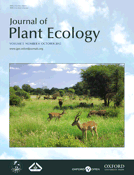
Journal of Plant Ecology
Connecting Researchers to Shape Ecological FuturesJournal of Plant Ecology, published by Oxford University Press, is a premier journal dedicated to advancing the scientific understanding of plant ecology. With an ISSN of 1752-9921 and an E-ISSN of 1752-993X, this journal has established itself as a leading resource in the field, maintaining a prestigious Q1 ranking across multiple categories in the 2023 Scopus rankings, including Ecology, Evolution, Behavior and Systematics and Plant Science. The journal's commitment to high-quality research is underscored by its influence in agricultural and biological sciences, reflected in its competitive percentiles. While currently not offering open access, its comprehensive scope spans various ecological issues critical to understanding plant interactions and ecosystems, making it an essential read for researchers, educators, and students alike. The Journal of Plant Ecology not only facilitates the dissemination of vital findings but also fosters collaboration within the global scientific community. Discover more about the latest innovative research and key developments in plant ecology, and contribute to the dialogue that shapes our understanding of environmental stewardship and biodiversity conservation.
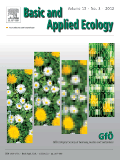
BASIC AND APPLIED ECOLOGY
Exploring the intricate connections of nature and science.BASIC AND APPLIED ECOLOGY, published by Elsevier GmbH in Germany, stands out as a premier journal in the field of ecology, evolution, behavior, and systematics. With its ISSN 1439-1791 and E-ISSN 1618-0089, the journal enjoys a distinguished reputation, evidenced by its classification in the Q1 category for Ecology in 2023 and impressively ranking #89 out of 721 in this domain according to Scopus. Since its inception in 2000, it has served as a vital platform for disseminating high-quality research that bridges theoretical insights and practical applications in ecology. Researchers, professionals, and students alike can look forward to the latest findings that not only foster a deeper understanding of ecological processes but also inform sustainable practices crucial for our environment. As the journal continues its journey through to 2024, it remains committed to advancing ecological knowledge and supporting innovative research in an ever-evolving field.

GLOBAL BIOGEOCHEMICAL CYCLES
Exploring the nexus of biogeochemistry and global change.GLOBAL BIOGEOCHEMICAL CYCLES, published by the American Geophysical Union, is a leading journal in the field of geochemistry that has gained significant recognition since its inception in 1987. With an impressive impact factor and a Q1 ranking in multiple categories such as Atmospheric Science, Environmental Chemistry, and Global and Planetary Change, it serves as a crucial platform for the dissemination of high-quality research. This journal emphasizes interdisciplinary studies focusing on biogeochemical processes and their implications for global environmental change, attracting contributions from a diverse range of scientific communities. Researchers, professionals, and students engaged in atmospheric sciences, environmental chemistry, and planetary sciences will find invaluable insights and state-of-the-art methodologies within its pages. GLOBAL BIOGEOCHEMICAL CYCLES continues to advance our understanding of the Earth’s systems, thus holding a pivotal position in shaping future environmental policies and sustainability efforts.
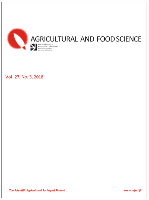
AGRICULTURAL AND FOOD SCIENCE
Advancing agricultural knowledge for a sustainable future.AGRICULTURAL AND FOOD SCIENCE is a prestigious journal published by the SCIENTIFIC AGRICULTURAL SOCIETY OF FINLAND, dedicated to advancing knowledge in the fields of agricultural and food sciences. With an ISSN of 1459-6067 and E-ISSN of 1795-1895, this open-access journal has been providing valuable insights and research findings since its inception in 2002. As of 2023, it holds a Q3 ranking in Food Science and is positioned at the 46th percentile within its Scopus category, ranking 210 out of 389 journals in Agricultural and Biological Sciences – Food Science. The journal features contributions from a global network of researchers, covering various topics including sustainable agricultural practices, food safety, and innovative food technologies. Based in Finland, the journal serves as an essential platform for scholars, professionals, and students who are committed to enhancing food security and agricultural productivity through rigorous scientific research. The convergence of interdisciplinary studies from 2004 to 2024 marks a critical evolution in the scope of agricultural and food research, making this journal a vital resource for anyone involved in these dynamic fields.
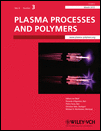
Plasma Processes and Polymers
Pioneering Research in Plasma and Polymer FrontiersPlasma Processes and Polymers is a leading peer-reviewed journal published by WILEY-V C H VERLAG GMBH, focusing on the innovative field of plasma science and polymer technology since its inception in 2004. With an ISSN of 1612-8850 and an E-ISSN of 1612-8869, this journal has established its reputation within the scientific community, holding a commendable Q2 ranking in both Condensed Matter Physics and Polymers and Plastics for 2023. Recognized for its rigorous standards and impactful contributions to the field, it ranks in the top 20% of the Physics and Astronomy category and top 26% of the Materials Science category, as per Scopus metrics. Catering to researchers, professionals, and students alike, the journal publishes cutting-edge articles that advance understanding and application of plasma processes in polymer science, thereby bridging theoretical insights with practical implications. While currently not offering open access, it provides a critical platform for advancing knowledge and fostering innovation, making it essential reading for those at the forefront of polymer research and applications.

NUTRIENT CYCLING IN AGROECOSYSTEMS
Connecting Science and Sustainability in Nutrient ManagementNUTRIENT CYCLING IN AGROECOSYSTEMS is a premier academic journal published by SPRINGER, dedicated to advancing the field of agroecosystem research. With an ISSN of 1385-1314 and an E-ISSN of 1573-0867, the journal has achieved remarkable standing, being ranked in the Q1 category for both Agronomy and Crop Science and Soil Science as of 2023. Over the years, it has emerged as an essential platform for interdisciplinary research focused on nutrient management, soil health, and sustainable agriculture practices, reflecting a growing global interest in environmental sustainability. The journal's impactful contributions are highlighted by its impressive Scopus rankings, where it stands at #68/406 and in the 83rd percentile for Agronomy and Crop Science, and #37/159 with a 77th percentile in Soil Science. Researchers, professionals, and students are invited to explore open access options for published articles, facilitating wider dissemination of knowledge in nutrient cycling and its critical implications for agroecological systems. Join the discourse by submitting your research and contributing to the ongoing conversation in this vital area of study.
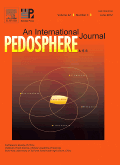
PEDOSPHERE
Advancing Soil Science for a Sustainable FuturePEDOSPHERE, published by SCIENCE PRESS, is a leading journal in the field of Soil Science, holding a prestigious position in the Q1 category as per the latest evaluations, reflecting its high impact and relevance in the domain. Established in 1996, this journal is committed to advancing our understanding of soil-related processes and their interactions with various environmental components, providing a platform for innovative and high-quality research. With an impressive rank of #13 out of 159 in the Scopus classifications for Agricultural and Biological Sciences, PEDOSPHERE reaches the 92nd percentile, indicating its significance among scholarly publications. Although the journal operates under traditional access options, it remains an essential resource for researchers, professionals, and students keen on exploring the complexities of soil dynamics and sustainability. By bridging interdisciplinary methodologies and fostering collaboration, PEDOSPHERE plays a vital role in addressing global challenges related to soil management, conservation, and ecological balance.